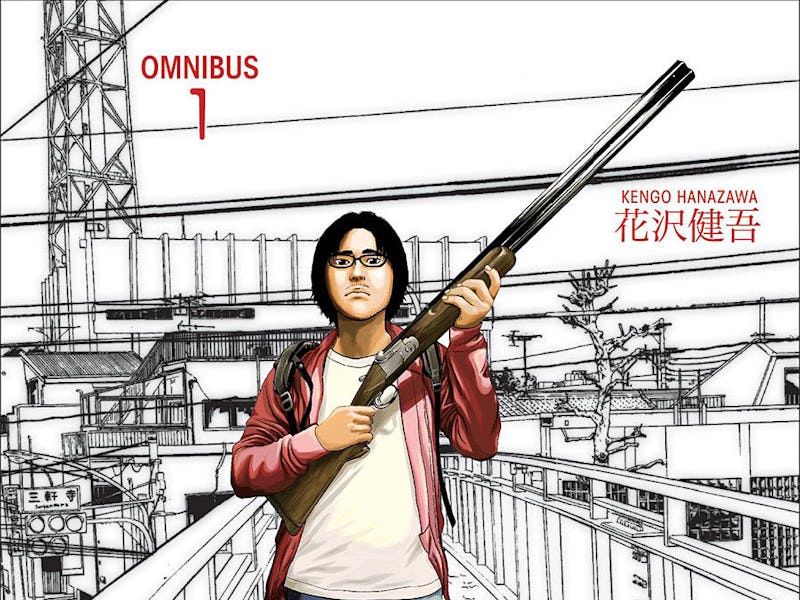I Am a Hero' Is Japan's 'The Walking Dead'
Before it invades the states, get familiar with Kengo Hanazawa's zombie sensation.

Zombies are getting long in the tooth here in the United States. The Walking Dead continues to be a cable TV juggernaut, but for the most part, pop culture is moving on. I hear demons might be the next big spooky thing.
And yet, Japan is continues to embrace the undead. While zombies have haunted Japan in video game franchises like Capcom’s Resident Evil and cult movies like Ryuhei Kitamura’s Versus, it’s a black-and-white graphic novel — just like The Walking Dead — that’s bringing the undead to Japan’s other media. Enter: I Am a Hero, a horror-satire from Boys on the Run creator Kengo Hanazawa.
A manga launched in 2009 and still running, I Am a Hero follows 35-year-old Hideo Suzuki, an underachieving comics artist who is trying to survive a zombie apocalypse. Unlike The Walking Dead or 28 Days Later, Hanazawa’s I Am a Hero takes its sweet time establishing the mundanity of Suzuki’s life in an ultra-realistic Japan. The pillars of establishment don’t collapse until well after the entire first omnibus, released by Dark Horse Comics just a few months ago.
A live-action movie adaptation wowed SXSW earlier this year, so it’s only a matter of time before Japan’s best zombie work to date begins infecting the west. If you want to be a little ahead of the curve (never mind the fact that the comic has been running for seven years now), here’s your official, spoiler-free 101 on I Am a Hero.
Who is Hideo Suzuki?
With a name that’s as common as “Joe Henry” or “Mary George,” Hideo Suzuki is a loser with a gun living in modern Japan. Timid and anti-social, Hideo often hallucinates imaginary people to talk to but totally sucks at real interactions. He has a girlfriend, but the fact that she keeps contact with her ex — a rival manga creator — brews a sense of professional and personal impotency for Hideo, who laments he’s a “side-character” in his own story.
Besides manga, which Hideo believes is one of the few areas where Japan dominates in the global popular culture, Hideo clings to his legally-owned rifle, which gives him a sense of identity. Given the current national discourse in America, it can be hard to fathom the rarity of guns and gun fetishization, but Hideo’s possession of one echoes how alone he feels (we never see him attend the rifle club to which he belongs). Whether or intentional or not, I Am a Hero reads like an accidental allegory or a foreign satire of the good guy with a gun myth, as the gun allows Hideo to survive a chaotic new world.
Creator Kengo Hanazawa is an unknown name outside Japan, and I Am a Hero is only his third series. But already Hanazawa is etching an identity as a new manga auteur, which is funny given that protagonist Hideo has elusive dreams of doing the same.
A quick word about the art
When there’s a manga about a manga artist, one has to expect the art to be good. I Am a Hero is a beautifully-drawn book, but it’s also ugly. This matters. Hanazawa approaches his series with a slavish devotion to realism. There’s little expressionism or cartoon-y elements in a medium often defined by the exaggerated: Hideo’s hallucinated friend and his girlfriend Takkeo look the most “cartoon”, ominously illustrating that they have no place in this world.
The realism makes Hideo look ugly and pathetic; you kind of want to punch him when he’s eating and talking to himself, or being useless when a zombie is attacking his office. Speaking of, the book’s zombies are an absolute nightmare. The Walking Dead is gruesome, but it has a style. I Am a Hero has no discernible style but monstrous realism, and you’ll be sick at every open pore and crawling maggot on rotting flesh.
Just dive in
Between the scarcity of guns and Hideo’s gate-keeping of manga culture in his long, exhaustive conversations to himself, there’s a lot of social commentary unique to Japan loaded (pardon the pun) in I Am a Hero. But no one needs to study sociology before checking out this zombie comic.
The English translation from Dark Horse does a bang-up job making Hideo’s story accessible. The book is, of course, a hit in its home country — I wonder if the audience and professionals in the overworked industry see themselves in Hideo, which once again is ironic since he’s a nobody — but I Am a Hero has the potential to be a monster elsewhere too. There will be unsavory types who relate to Hideo despite (or because of) his lonely detestability, but in a world populated by the same kind of zombies, and too many of them, there stands Hideo, locked and loaded and different.